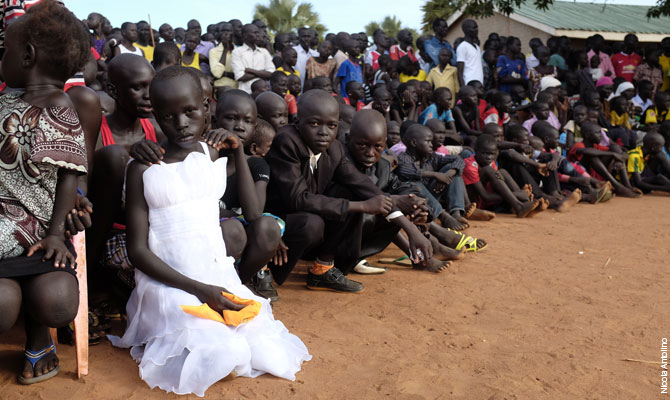South Sudan Apparent Calm
After last week’s clashes, a ceasefire has been called in Juba, and, for the first time, CUAMM’s staff left the compound where they had been “hibernating” for several days. Valerio Granello describes the air of apparent calm, though the entire country is still wracked with tensions.

The situation remains tense in Juba, South Sudan, less than a week after the outbreak of clashes between armies loyal to the president Salva Kiir and those loyal to the vice president Riek Machar, leading to the deaths of many hundreds of people, though there is still no official count. The ceasefire is holding for now, and there is an atmosphere of apparent calm as we await the next moves of the fighting sides.
Valerio Granello, our country representative in South Sudan, is monitoring the situation and keeping contact with the more than 40 international Cuamm doctors and staff working in the country. Two Cuamm aid workers are in Juba with Granello, and all are living in a compound, shared with other international organizations, emptied out by evacuations ordered by individual NGOs or foreign embassies.
Valerio Granello told us, “Yesterday, Thursday, we left home for the first time to go to the office, after nearly a week inside the compound. Technically they say that we have been “hibernating.” The office is across town. To reach it we avoided the main streets as much as possible to not cross army checkpoints, which are still active in sensitive parts of town.”
Granello continued, “The situation is quite strange. Other than 80% of foreigners having left Juba and there being much less traffic as a result, at first glance, it seems as if nothing had happened. The tanks have left the city, and there are no major signs of what happened. People seem to be returning to their usual lives, but Friday and Sunday there was full-fledged urban warfare. We could hear gunshots from home and helicopters flying over the city. We were scared, but our South Sudanese colleagues were even more so.
This is the impression you get going through areas that were not scenes of fighting, still guarded by the military, where operations for recovering victims’ bodies are ongoing.
Talking with my colleagues about the “normality” we feel now, we couldn’t help but note this people’s resilience, most of whom were born into and are still living in a conflict situation.”
The calm we see in Juba seems to be only apparent. Though Vice President Machar’s troops are out of town to avoid new clashes, all states of South Sudan are still pervaded by tensions to varying degrees. Just yesterday news came of clashes in Kediba, far from the capital, where CUAMM staff is working on a local public health project, just two hours from the Lui Hospital.
Granello says that tensions in this area have resumed between so-called “arrow boys”, groups of young armed men that had destabilized the area in September 2015 in opposition to the Salva Kiir government and its troops. Coordinating from Juba, where the tension is currently the highest, we are in constant contact with our doctors and staff throughout the country. We know that right now the hospital staff is very protected, because, beyond international conventions, the local population, and even the insurgents, recognize the importance of the doctors’ work. We saw this at Lui as well, where we decided to stay despite the clashes last year. The local community had recently publicly recognized our commitment as an active participant in the difficult peace process: “You know you have a friend when they stay by you in your moment of need”, the local prefect said to us at the time.
This is why the entire staff of Doctors with Africa Cuamm chose not to abandon South Sudan, and to continue providing health care during a critical moment for the people, who suffer severe consequences of the internal fighting that has gone on for years, often attracting scant media attention.
“We can only hope the situation resolves soon” Granello concluded. “The South Sudanese can not leave the country. The borders are closed to prevent a mass exodus. But there are thousands of displaced people — 45,000 in the Juba area in recent days alone. People move from one place to the other to avoid new dangers, with all the hardships and health problems that come with that. People go through the events and force themselves to move on, but it cannot go on forever. And if the capital stops like it did in these days, the entire country stops.”
Join us
Join our efforts
Charity gifts
Go to the Italian website to choose your gadget.